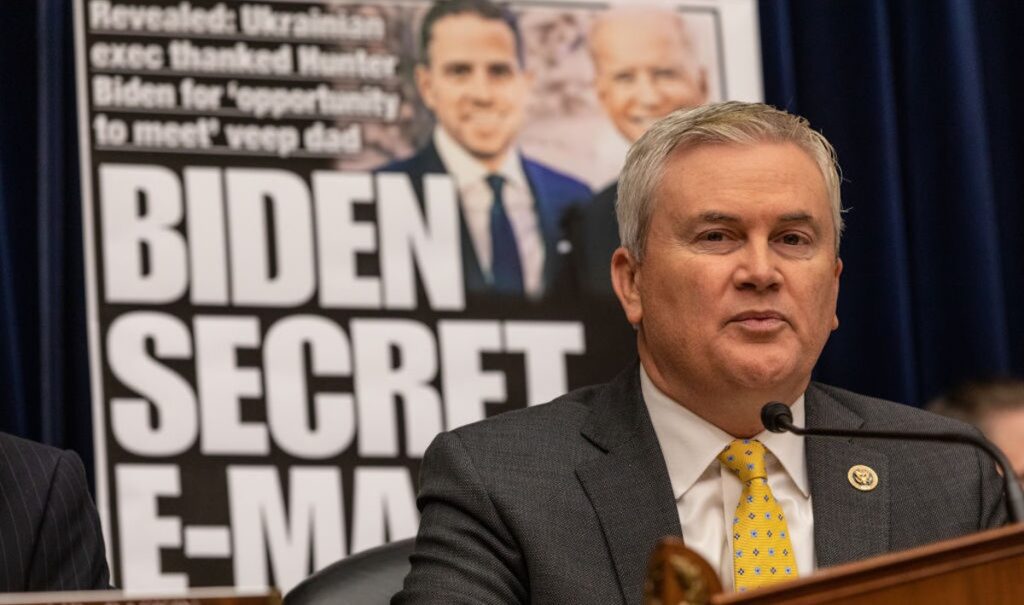In an unprecedented revelation, a high-ranking former FBI supervisor confirmed “key” details regarding whistleblower testimony about the federal probe of Hunter Biden, President Joe Biden’s son, according to a top Republican legislator. This emerged during a session with the House Oversight Committee on Monday, supervised by Chairman James Comer (R-KY), a mere two days before Internal Revenue Service (IRS) whistleblowers are set to testify about the same case.
🚨🚨🚨@GOPoversight today conducted a transcribed interview with a former FBI supervisory special agent assigned to the FBI’s Wilmington office and the Biden criminal investigation.
Read my full statement below.👇 pic.twitter.com/h9T1dFsez1
— Rep. James Comer (@RepJamesComer) July 17, 2023
The now-retired FBI operative from the Wilmington office, once assigned to the Biden criminal inquiry, confirmed pivotal parts of the IRS whistleblower’s testimony, Comer revealed. He stated, “The night before the interview of Hunter Biden, both Secret Service headquarters and the Biden transition team were tipped off about the planned interview.” This sudden change of plans, according to Commey, caused the IRS and FBI criminal inspectors to miss the opportunity to interview Hunter Biden during the investigation.
These alarming disclosures parallel the sworn statements of IRS officials, supervisory special agent Gary Shapley and an individual referred to as “Whistleblower X”. They corroborate the claim that interview plans with the younger Biden, initially slated for early November 2020, were mysteriously overridden. This development then led to Biden’s public announcement that he was under investigation.
Despite these serious allegations, the lengthy probe into 53-year-old Hunter Biden has only culminated in a plea deal for tax and gun violations, sparing him jail time. The court is scheduled for a hearing regarding this pact on July 26. However, these whistleblower allegations intimate potential political interference, inspiring queries about whether the Department of Justice (DOJ) has deliberately delayed the Hunter Biden investigation. Consequently, it’s possible that the statute of limitations on graver charges—stemming from his tenure on the Ukrainian energy company Burisma Holdings’ board when his father held sway over U.S. policy in Ukraine—may have lapsed.
Comer didn’t share direct quotations from the Monday release, yet he highlighted several “key takeaways”. According to his findings, there were many interviews set for December 8, 2020, as part of Hunter Biden’s criminal inquiry. Disconcertingly, IRS Supervisory Special Agent Gary Shapley and a former FBI supervisor learned that the FBI headquarters had informed the Secret Service about the planned interview with Hunter Biden. Additionally, the Biden transition team was also made aware of the proceedings – an unplanned twist that obstructed the agents’ efforts. Following these avoidable missteps, the investigators missed their scheduled interview with Hunter Biden.
Meanwhile, Delaware’s U.S. Attorney David Weiss, a Trump appointee, assured House Republicans that he possesses the “ultimate authority” to decide on charges, and Attorney General Merrick Garland concurred. Meanwhile Hunter Biden’s attorney, Chris Clark, dismissed any critique of the probe’s thoroughness as “preposterous and deeply irresponsible.”
Despite denials, Comer remained firm on the issue, expressing his disgust with what he perceives as a two-tiered justice system that protects the Bidens. “The Justice Department’s efforts to cover up for the Bidens reveals a two-tiered system of justice that sickens the American people,” he proclaimed in his statement.
In conclusion, these revelations underscore the deep, abiding need for truth and transparency in our public offices. The Oversight Committee, working in conjunction with the Judiciary Committee and Ways and Means Committee, should remain steadfast in seeking answers and accountability. The public deserves nothing less. This is not just about one family’s possible transgressions, but about maintaining trust and confidence in our institutions of justice. The system must operate without favor or prejudice; no citizen, regardless of status or political affiliation, should be above the rule of law.



